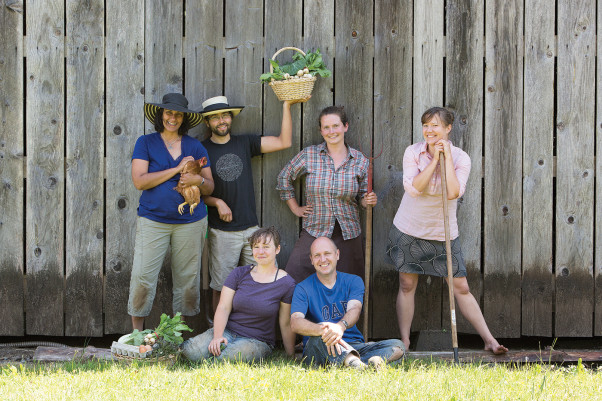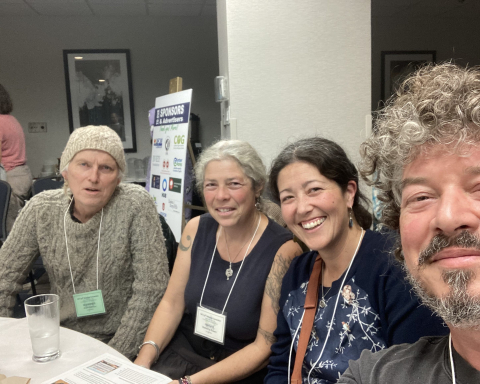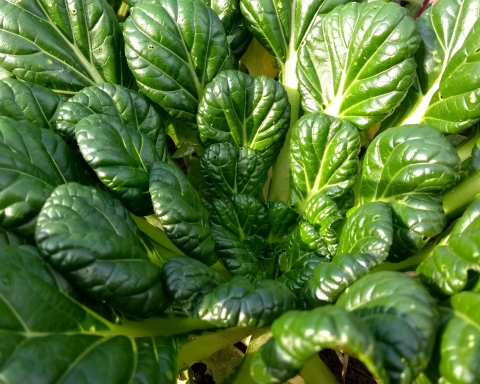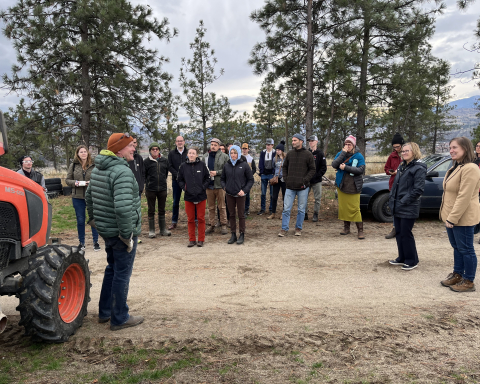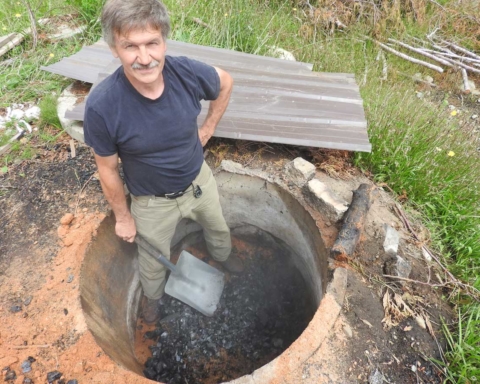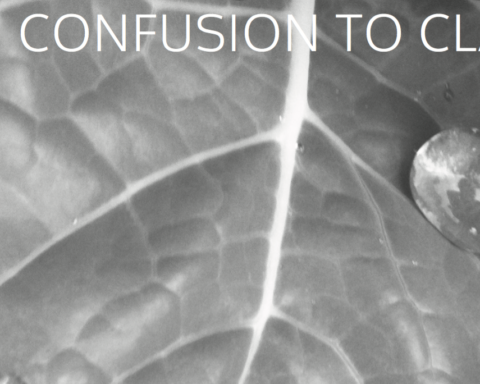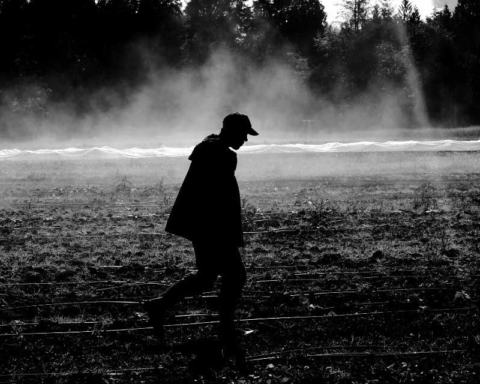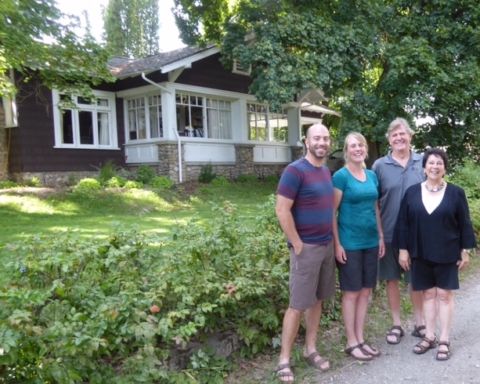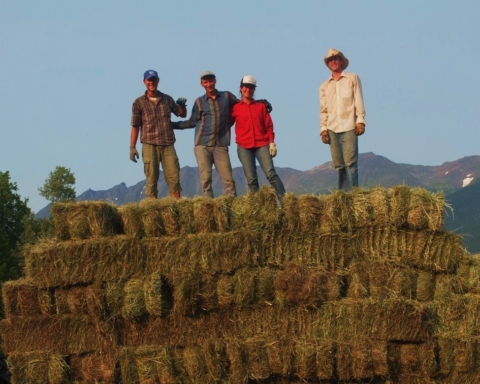Moss Dance
Get Your Produce in a Pile!
I was lucky to witness the flourishing of the Saanich Organics farming (and marketing!) co-operative when I lived and farmed on southern Vancouver Island. In their book All the Dirt: Reflections on Organic Farming, Saanich Organics farmers Robin Tunnicliffe, Heather Stretch, and Rachel Fisher describe an amusing scene—it may be familiar to you, too. Picture three stressed out, overworked farmers, hauling produce in small, worse-for-wear pick-ups—all of them headed to make deliveries to the same restaurants!
Back in 2012, they might as well have been describing me. At my new farm in the Comox Valley, I was spending four and a half hours every Tuesday delivering 25 CSA shares to members’ doorsteps after a morning of frantic harvesting and packing shares.
But that all changed when I met Arzeena Hamir and Neil Turner at Amara Farm in 2013.
As soon as we met, Arzeena and I started hatching plans for a growers’ co-operative. Thanks to those clever Saanich Organics farmers, I was feeling pretty excited about the idea of collective marketing by this time. The only issue was, we needed three members to start a co-op! So we began with a two-farm Community Supported Agriculture (CSA) program. We also took turns at the local farmers’ market where we sold each others’ produce under the Merville Organics banner. By uniting under Merville Organics, our marketing efforts could be more concise and targeted.
By 2015, several of our apprentices graduated onto their own farms, and some new young farmers were setting up shop in town. We finally had our founding member quorum and took the initial steps towards “inco-operating” through the BC Co-operative Association.
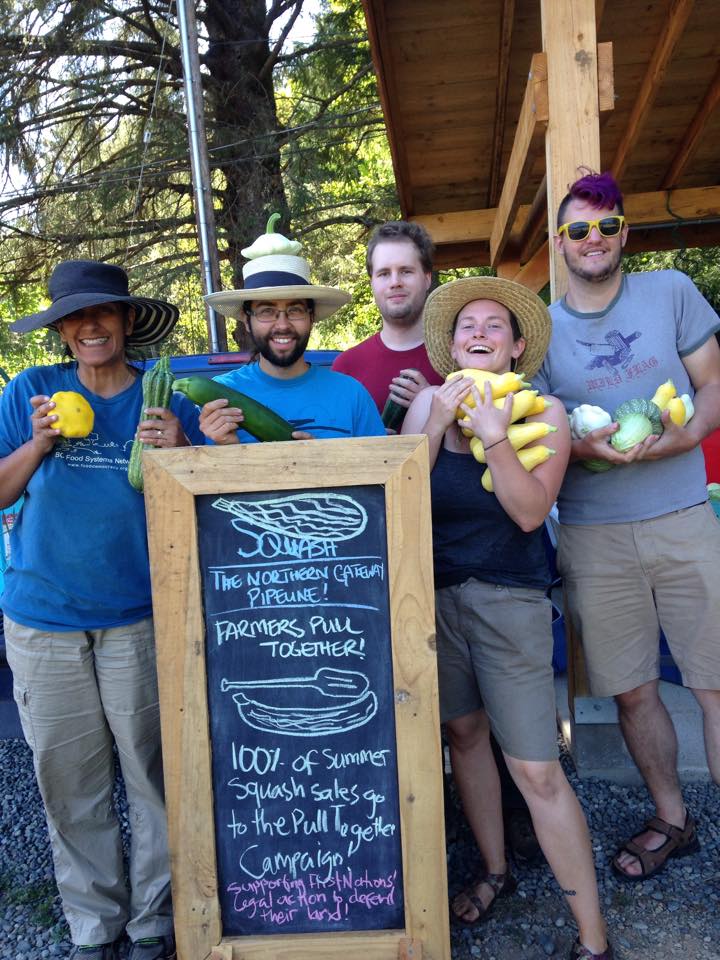
Why Collaborate?
I’m not going to lie: collaboration takes a lot of extra work at the beginning. Setting up tracking systems, establishing effective group dynamics, and doing the legwork of starting up a shared business is a huge commitment. It took many long meetings and volunteer hours from our members to get started. As we begin our second year, our co-operative still relies mostly on volunteer labour from our grower members to keep things running. For many farmers, co-operative or not, marketing comes at the end of a long list of things that just can’t wait, like thinning the carrots. Still, in our view, the benefits outweigh the challenges.
Despite the volunteer hours we spend running the co-op, our goal is to lessen the marketing workload on our members so they can spend more time farming. Here are a few of the best results of our work together:
Increased Marketing Reach
People power is real when it comes to marketing a farm—we’ve seen this time and again when our seven grower members combine their contacts in the community to spread the word about our products.
For example, when we post about our CSA on our co-op Facebook page, we can reach a portion of our 800 followers (thanks to Facebook’s limiting algorithms we can’t reach them all at once for free). If each member shares that post, we exponentially increase our online reach. Friends, family members, and co-workers who know us personally take an interest and spread the word for us. This kind of grassroots marketing is essential in small communities.
Abundance & Visual Appeal
Working together, we not only increase our marketing reach, we also increase the variety and consistency of the products we supply to our markets. A three-farm market table overflows with produce. This in turn revs up interest in our market stall—the more variety you’ve got, the more people you’re going to attract to your table!
Shared Infrastructure
Thanks to our marketing co-op, our new grower members are saving on farm start-up costs by sharing essential equipment such as a walk-in cooler, wash station, delivery vehicle, harvest totes, packaging materials, and co-op office. We hire a bookkeeper for the co-op which means financial record-keeping is much simpler for all of our members. As well, we share marketing resources—everything from printed materials to social advertising, thus reducing the cost and the workload for all.
Grower Member Specialization
Sharing in the larger tasks of operating a farm business means our grower members can specialize in roles that they enjoy and excel at such as customer relations, farmers’ markets, marketing, or sales tracking. The increased number of growers also enables each farmer to specialize in growing crops they have success with instead of trying to grow a full array of crops to ll their own CSA program. Several of our members have expertise in marketing and the co-operative as a whole gets to reap the benefits!
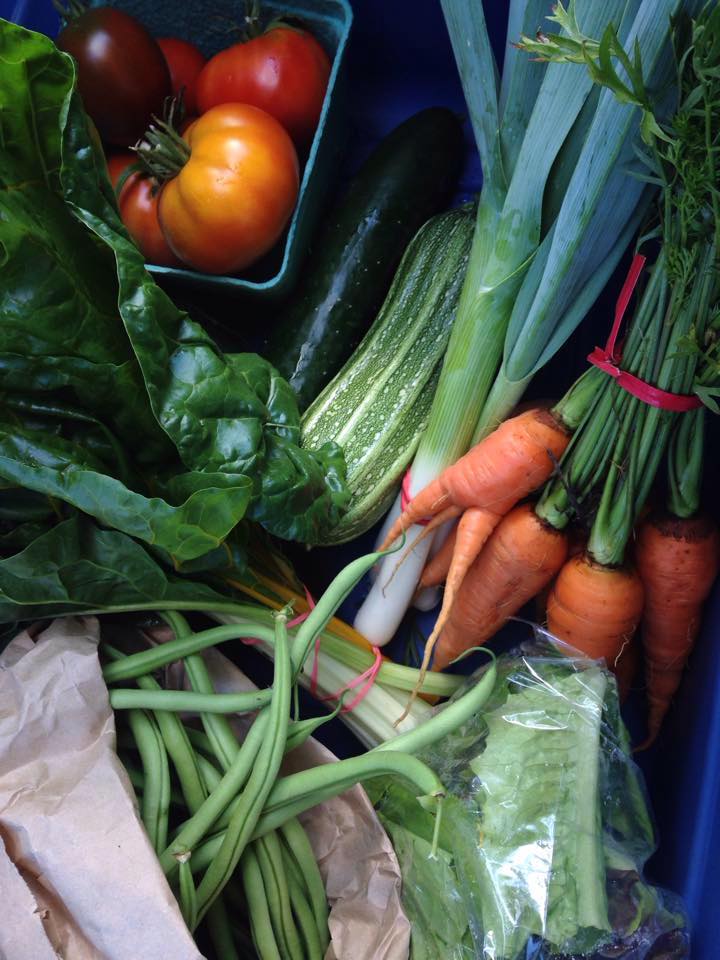
Harvesting Grassroots Media
We use three social media platforms and one in-person platform to get the word out about our CSA programs and our annual spring plant sale. During CSA season, we post our weekly blog to all of our social media platforms.
Facebook is definitely the workhorse in our social media strategy. All of our members have active personal Facebook accounts, and this has definitely helped us to gain a good following on our Merville Organics Facebook page. It’s not all free, but it’s not expensive either. The reality is, Facebook doesn’t want you to get much exposure for free, especially if you’re running a business. That’s why we “boost” posts strategically to increase our reach at key times in the season.
Boosting Posts on Facebook
We boost Facebook posts 5-7 times per year, usually with a budget of $14-25 per boost. Here’s the break- down of our strategy:
- Spring CSA launch
- #CSADay
- Spring CSA – one week before the sign up deadline
- Spring plant sale announcement
- Spring plant sale reminder (2-3 days before the event)
- Fall CSA launch
- Fall CSA – one week before the sign up deadline
Developing a good following on Twitter can take a long time, and a bit more strategic thinking. If you really want to drive traffic to your Twitter feed, it’s important to re-tweet, post relevant content, and not just plug your sales. In our experience, Twitter isn’t a popular social media platform in our community—so it means our reach is a bit more far-flung and therefore doesn’t help much when we are selling CSA shares.
Instagram is great for farms! We live in image-rich en- vironments—whether we’re growing microgreens or raising sheep—and people LOVE farm pictures. We use Instagram to build a story about our farms, who we are and what we are offering to our community. It’s not so much about hard sales with Instagram, it’s more about the slow process of relationship building.
“Like” Each Other
Our philosophy as a co-op is that there is no competi- tion, only more room for collaboration. We take this approach in social media too. When that amazing local yoghurt company is launching a new avour, or a new locally-owned feed & supply store is opening in town, share that news on your social media feeds!
Building this network of businesses who support each other’s work means we are creating fantastic new local economies where community members can clearly see where to redirect their dollars. Think of it as over-throwing the stodgy, competive capitalist system, one “Like” at a time.
In Person at Farmers’ Markets
If you’re running a CSA, potential members really appreciate the chance to talk to a real person and ask questions about the program. It also helps that we have solid weekly face-to-face connections with people at the market—that kind of trust helps people to take the leap to try something new. The marketing tactic on this one is so simple: put up a sign at your booth that says, “Ask us about our CSA program!”
Co-ops Love Co-ops!
Don’t be shy about reaching out to the co-ops in your community if you’re starting your own collective venture! The beauty of co-ops is that they are creating a culture of collaboration, and what could be more exciting than more people joining in?
Suggestions for Starting Your Own Marketing Co-operative
If you are interested in starting your own marketing co-op, here are a few suggestions:
- Get together and host a meeting with farmers in your community who you think you would enjoy working with (liking each other IS essential)
- Look for common ground: What challenges are growers facing? Do you have shared goals & values?
- Brainstorm opportunities: What could you do together that you can’t do alone?
- List needs & resources: What do you have that you can share? What do folks need to improve their farm businesses?
- Start small: collaborate on something simple & manageable in the beginning and expand on your successes
Moss Dance is an organic farmer & founding member of the Merville Organics Growers’ Co-operative. She also works with the Young Agrarians on Vancouver Island.
Photo credit: Boomer Merritt
Facebook: MervilleOrganics
Twitter: @MervilleOrgCoop
Instagram: @mervilleorganics


